“Save one life, you’re a hero. Save 100 lives… you’re a nurse.”
-Anonymous
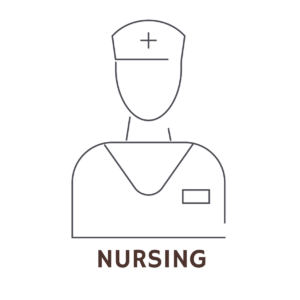
Everyone wishes for work that’s meaningful, interesting, secure, and lucrative. If we’re lucky, most of us wind up with a job that fulfills one or two of these wishes. Nursing is one of the only jobs that delivers it all: meaningful work, interesting job duties, job security, and high pay. Nursing isn’t an easy profession, but it’s one of the most important- and most rewarding- careers out there.
The healthcare industry is the number one employer in the US, and nurses are the biggest job in the entire healthcare sector. There are three times as many registered nurses as doctors in the US, and in many cases, nurses have taken over many of the job duties traditionally performed by doctors. That’s why today, nurses have more authority, autonomy, and importance than ever before. They also have a high degree of professional flexibility, practicing with all sorts of people in all types of settings. Nursing degrees are in high demand, and lead to impressive salaries as well.
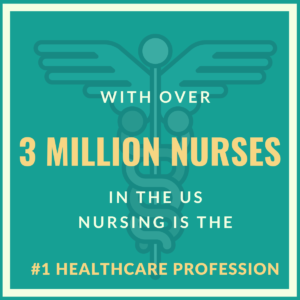
If you want to develop a lucrative and life-saving career, you’ve come to the right place. Our Guide to Nursing Degrees has the most up-to-date facts, trends and info on nursing degrees, nursing jobs, and the future of the industry, along with links to articles and rankings you can use to dig deeper.
What is the Job of a Nurse?
Nurses are the lifeblood of patient care, doing every type of task related to healthcare, from the most routine to the most advanced. Nurses provide for patients’s medical needs, assist doctors, deliver health education, and consult with medical teams to coordinate health care services.
These tasks cover a huge range of job duties. Nurses change bedding and check vital signs. Nurses also prescribe medications and diagnose illness. According to the American Nursing Association,
“The key unifying characteristic in every [nursing] role is the skill and drive that it takes to be a nurse. Through long-term monitoring of patients’ behavior and knowledge-based expertise, nurses are best placed to take an all-encompassing view of a patient’s wellbeing.”
Nursing is more stratified than most patients probably realize. Some nurses have no college level nursing degree, others may hold a doctoral degree in nursing. Some make as little as $45,000, while others make over $200,000. In fact, there are several different types of nurse jobs, as well as specializations.
The main jobs within the nursing profession are:
- Licensed Practical Nurse (LPN)
- Registered Nurse (RN)
- Advanced Practice Registered Nurse
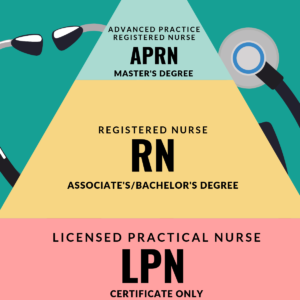
What do Different Types of Nurses Do?
Licensed Practical Nurses (LPNs) are responsible for the most routine parts of patient care. Their job duties include taking vital signs, doing patient intake, and monitoring medical equipment readings. Registered Nurses (RNs) perform healthcare tasks that are more involved. Examples of job duties include giving medication and running tests. Advanced Practice Registered Nurses (APRNs) are specialized experts and perform advanced medical tasks. Job duties vary by specialty; nurse anesthetists monitor patient responses to anesthesia, nurse midwives help deliver babies.
Where do Nurses Work?
One of the perks of nursing as a profession is its flexibility. As frontline medical professionals, nurses work everywhere. The majority of nurses work in hospitals, while others work in smaller healthcare facilities like urgent care clinics. Many nurses also work in private practices of individual doctors or doctor’s group practices. Large non-medical institutions like schools, resorts, prisons, and military bases also have nurses on site to care for staff and consumers.
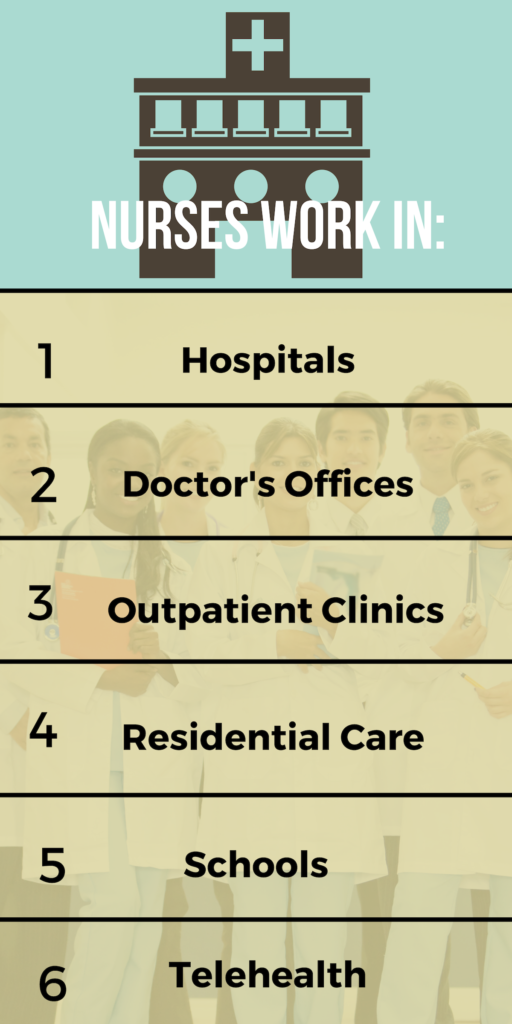
Nurses who want to see the country- or the world- can enjoy another great perk: travel. Registered Nurses have universal credentials, and can legally practice as “travel nurses” anywhere in the world. Travel nurses sign on for brief stints of 13 to 26 weeks stints invites where nurses are in short supply, and have control over where they go and for how long. If your dreams include saving lives in remote parts of the globe or exploring the world through hands-on work, travel nurse is an ideal position.
Nowadays, you can also put your nursing degree to work in telehealth. Telehealth involves using technology (usually video conferencing) to diagnose medical problems, monitor conditions, and interface with patients and medical teams. You might assess a patient’s symptoms from your home via video chat, conduct telephone triage from a hospital during a crisis, or monitor the process of at-home post-op recovery through texted photos. The possibility of working from home is a major perk for many nurses seeking a good work/life balance.
How Much Money Can You Earn with a Nursing Degree?
Nurses report high career satisfaction, but this is a job that’s rewarding in more than spirit. Nurses’ salaries are high and are continuing to climb over time.
General registered nurses make $70,000 on average. That’s more than double the salary of the average US worker. This is just part of a long-term trend of rising salaries for nurses. According to the Bureau of Labor Statistics (BLS)nurses’ salaries have risen 2.6% annually each year since 2014. This means that already-impressive salary of $70,000 will almost certainly keep growing in the years to come, as nurses are in increasingly high demand.
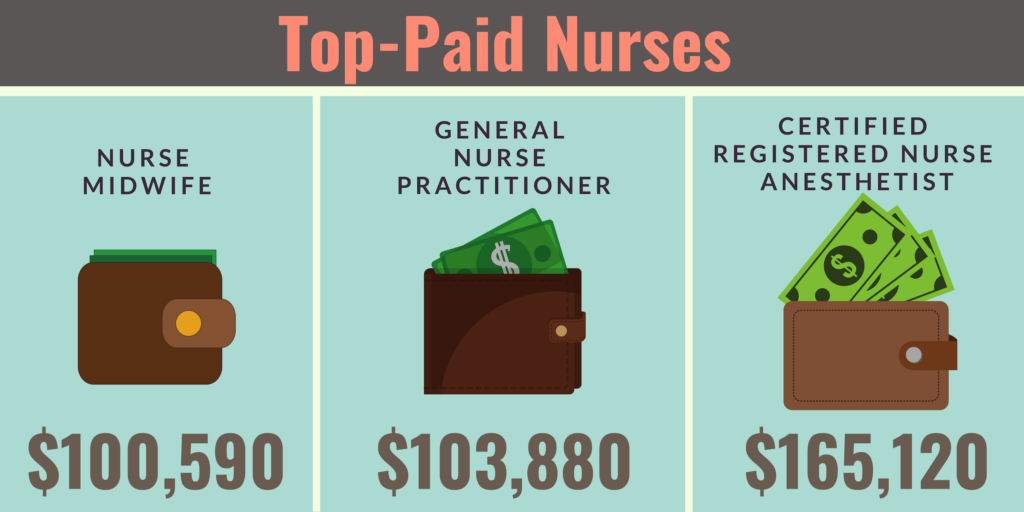
With an advanced nursing degree, you can earn even more money. With a master’s in nursing and certification, you can become an Advanced Practice Registered Nurse (APRN). These top experts in the field earn excellent pay; the BLS reports that APRNs earn $110,930 per year on average. The highest-highest-paying specialization among APRNs is that of Certified Nurse Anesthetist. According to the BLS, the average pay for nurse anesthetists is $165,120, and those in the top 25% of their field make $194,990 per year!
Nurse salaries vary based on location as well as specialty. Nurses in populous states with large economies and big cities make much higher salaries than those in states with small economies and low population densities, and nurses in rural areas. At the extreme end of the spectrum, nurses in California make $101,260, while nurses in Iowa make a mere half of that, at $55,040 per year.
Are Nursing Degrees in Demand?
Nursing degrees are not only in demand, they are one of the most in-demand degrees out there. The BLS anticipates that the need for registered nurses (the most common nursing job type) will go up 15% from 2016 to 2026, opening up a full 438,100 new jobs. That’s more than twice as fast as the national job growth average! Specialists are in even higher demand. The BLS states that the need for Nurse Practitioners will rise by no less than 36% between 2016 and 2026.
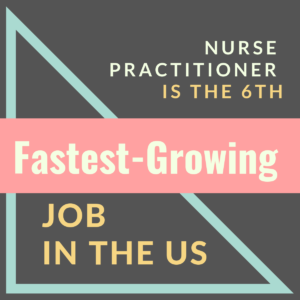
Why are nurses in such high demand? There are a few reasons. First, a large proportion of the country’s nurses are reaching retirement age. Second, the number of doctors in the nation is not rising fast enough, meaning nurses are being sought out to take over some of the responsibilities traditionally performed by doctors. Meanwhile, the average person is living much longer, which means a high need for elder care, and more incidence of conditions like osteoporosis and dementia. Finally, the incidence of preventable chronic conditions like diabetes and heart disease is rising, meaning a goring need for medical management and health education.
Moreover, nursing is a recession-proof job. Sure, job duties are always evolving (today’s nurses are more likely to work remotely or do advanced medical care, for instance), but sick people aren’t going anywhere, and neither is the need for skilled people to treat them. The need for direct patient care is permanent and can’t be outsourced or automated, so pros with nursing degrees will always be needed.
Can I Become a Nurse without a Degree in Nursing?
Yes, it’s possible to become a nurse with just a high school diploma. A Licensed practical nurse (LPN) aka Licensed Vocational Nurse (LVN) does not need to have a college degree in nursing, but does need to earn a certificate through a community college or online course. As mentioned above, LPNs perform routine care tasks like patient intake, measuring vital signs and collecting samples for testing.
To become an LPN, you’ll need to complete a year of state-approved training, gain clinical experience, and pass the National Council Licensure Examination for Practical Nurses (NCLEX-PN). As an LPN, you can expect to make an average salary of $45,000. Demand for this position is very high, and the BLS predicts a growth of 25% between 2016 and 2026.
While the nation’s nurses once had little higher education, that’s been changing as the healthcare system becomes larger and nurses take on larger and larger roles within it. Most nurses today hold an associate’s in nursing or a bachelor’s in nursing. With these degrees comes a higher level of professional responsibility and compensation.
More Info:
What Is the Difference Between a Licensed Practical Nurse and a Registered Nurse?
What Can I Do with an Associate’s in Nursing?
An Associate’s Degree in Nursing (ADN) is a two-year college degree which is entirely focused on nursing classes. Your time to completion, of course, may be slower or faster depending on whether you’re enrolled full-time, part-time, or in an accelerated degree program. This undergraduate degree typically covers 60 semester credit hours (or 90 quarter credits), or about 20 classes. You’ll study topics like:
- anatomy and physiology
- biology
- nutrition
- basic nursing procedures
You classwork will also focus on preparing you to sit for the National Council Licensure Examination for Registered Nurses (NCLEX-RN). Passing this exam will allow you to practice as a registered nurse in many sites. Nurses who work as RNs and hold an ADN are often referred to simply as “ADNs.”
What Can I Do with a Bachelor’s in Nursing?
While it’s possible to become an RN with just an ADN, employers prefer nurses with a bachelor’s in nursing. In fact, higher nurse education is associated with better patient health, and many employers, like large hospitals, actually require their RNs to have a bachelor’s in nursing. Those RNs who hold a bachelor’s in nursing are simply referred to as BSNs, to distinguish them from ADNs.
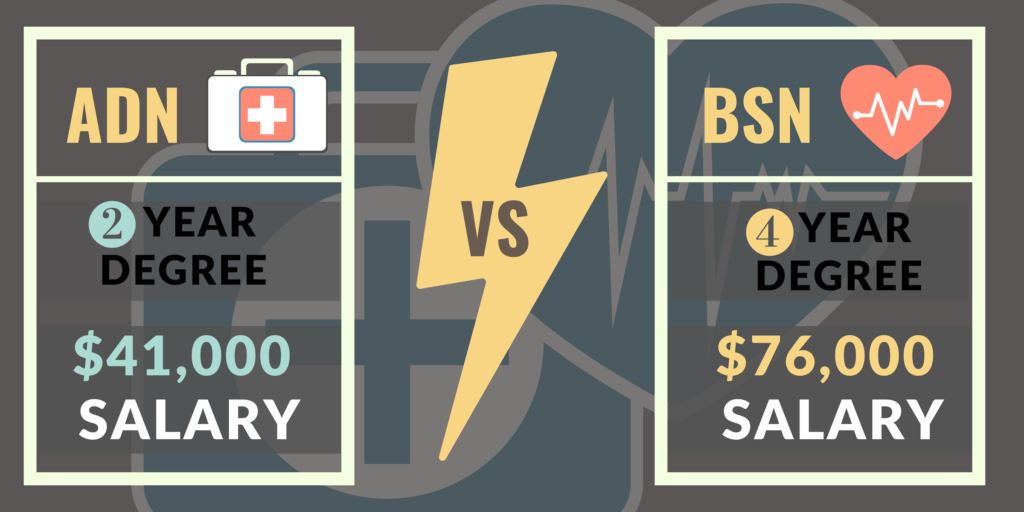
A Bachelor’s Degree in Nursing (BSN) is a four-year college degree which includes both general education and nursing classes. As with an associate’s degree, your time to completion may vary based on your course load and rate pf progress. This undergraduate degree typically covers 120 semester credit hours (or 180 quarter credits)- about 40 classes. Your general education classes will cover courses in liberal arts, and you’ll have electives (free choice classes) as well. Within the nursing major, you’ll study topics like:
- evidence-based practices
- medical assessment
- nutrition
- nursing practices
Your nursing major courses will be highly focused on prep for the NCLEX-RN, allowing your to qualify as an RN. As a BSN, you can expect to earn a higher salary, and will be qualified to advance into important and high-paying nurse management positions.
More Info:
What Is the Benefit of a BSN Degree Vs an ADN Degree?
What is an RN to BSN Program?
With all the perks that come with earning a bachelor’s in nursing, it’s no wonder that so many people with an associate’s in nursing want to earn a bachelor’s in nursing. A RN to BSN program is a two-year bachelor’s program specifically for those with an associate’s in nursing. To get into an RN to BSN program, you’ll need to first pass the NCLEX-RN. With the licensing exam and associates level for nursing classes already under your belt, a large component of the RN to BSN consists of general education classes, like math, biology, English and history. You’ll take about 20 classes, totaling 60 semester credits (or 90 quarter credits).
Needless to say, most ADNs are already working as RNs, and continue their nursing work while enrolled in their RN to BSN program. That’s why so many of these programs are offered as part-time and/or online nursing degrees. This added flexibility and convenience makes it easier for nurses to balance their coursework and work schedules.
Because employers value a bachelor’s in nursing so highly, many employers offer tuition reimbursement to ADN-level employees who want to pursue their BSN degree on a part-time basis through an RN to BSN program.
What Can I Do with a Master’s in Nursing?
If you already hold a bachelor’s in nursing, there are many reasons to consider going on to earn your master of science in nursing (MSN). Only a bachelor’s in nursing (and a passing grade on the NCLEX-RN exam) will qualify you to enter a master’s program in nursing- a related undergrad degree like physical therapy, public health or nutrition won’t qualify.
A master’s in nursing is a two-year degree covering studies in a specific specialty area of nursing. Time to completion, of course, varies based on your pace of completion, and may be shorter or longer. Instead of taking courses in nursing in general, or general education, your coursework for this master’s degree will vary based on your area of specialty. A Psychiatric Nurse Practitioner specialty program, for instance, will cover classes like Psychopharmacology and the Diagnostic and Statistical Manual of Mental Disorders. You’ll also need to complete a thesis or research-based capstone project at the end of your studies to complete your master’s in nursing.
Once you have earned your master’s in nursing and passed an exam in your specialty area, you’ll be qualified to practice as an Advanced Practice Registered Nurse (APRN). APRNs are highly paid experts within a specific specialty area of medicine. APRN types include Clinical Nurse Specialist, Nurse Practitioner, and Certified Registered Nurse Anesthetist.
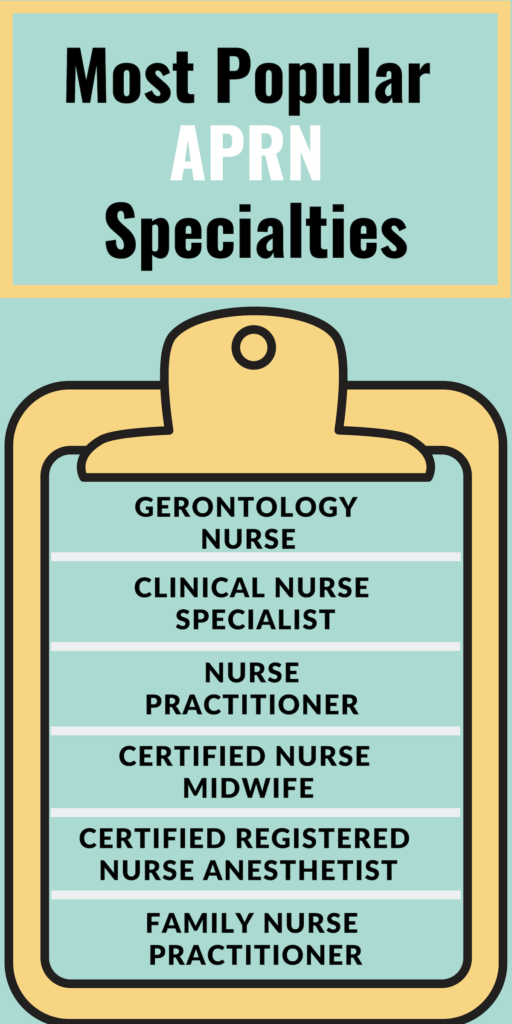
APRNs can perform high-level job duties such as diagnosing illness, writing prescriptions, and delivering primary care. They are also qualified to manage other medical professionals, oversee health systems and design programs. As an APRN, you may also wish to move into an administrative or legal role. As with a BSN, employers value an MSN highly, and a great many offer tuition reimbursement programs for employees pursuing a master’s in nursing.
More Info:
What Is the Benefit of an MSN Degree Vs a BSN Degree?
What Degree Does a Clinical Nurse Specialist Need?
What Is the Difference Between an Anesthesiologist vs Nurse Anesthetist?
What Can I Do with a Doctorate in Nursing?
If you want to achieve the peak of education in the field of nursing, you may wish to pursue a doctorate of nursing practice (DNP). A doctorate in nursing is a three-year degree focused on clinical leadership in a healthcare setting. Students may take longer to earn their degree while working, finishing in as many as six years.
This degree indicates the highest level of expertise, and is designed to prepare nurses to be leaders and change makers who shape policy and improve healthcare programs. Only 7% of nurses hold a DNP, making this a pinnacle degree. Class topics may include:
- data analysis
- statistics
- leadership
- nursing philosophy
- evidence-based models
With a doctorate in nursing you can serve as a primary caregiver, an educator, an administrator and a clinical leader. DNPs are especially sought-after as instructors of other nurses.
Can I Get a Nursing Degree Online
It’s very possible! In fact, earning a nursing degree online is an incredibly popular option. That’s because so many people are already working as nurses or nurse’s aides while they pursue a degree in nursing. Since nursing is an already demanding job, that makes maximizing their time and efficiency in each class very important. Online nursing degree programs do both.
In an online nursing degree program, you can take classes and complete assignments from home (or anywhere!) at any time. That’s ideal for nurses, who often work odd or changing hours. Online nursing classes also usually make use of multiple learning formats, like video lectures, discussion boards, and video chats, which can help students stay engaged with the course materials. Finally, many online nursing degree programs offer credit for work experience or job training. If you’re a seasoned professional, you might be able to complete your degree more quickly in such a program.
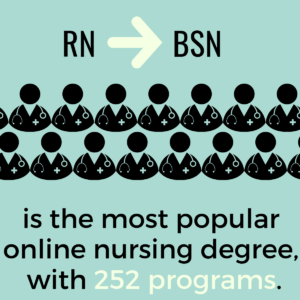
What is the NCLEX Exam?
Whatever nursing degree you earn, you’ll need to demonstrate your knowledge on one of the NCLEX exams. The National Council of State Boards of Nursing (NCSBN) administers several exams for nurses:
- National Council Licensure Examination for Practical Nurses (NCLEX-PN)
- National Council Licensure Examination for Registered Nurses (NCLEX-RN)
Since most nurses are RNs, the NCLEX-RN is overwhelmingly the most popular exam for new nurses to take, and is required before they can practice. Your associate’s or bachelor’s in nursing will provide a lot of the preparation you’ll need for this notoriously tough exam, but most students also opt to take a prep course.
The test consists of 265 questions but you can choose to answer as few as 75 of these. You’ll have 6 hours to complete the exam, which is entirely multiple choice. There is a $200 fee to sit for the NCLEX-RN, and a total of 8 attempts per year are allowed. Don’t be surprised if you need to re-take it before passing- only 87% of new nurses pass the NCLEX-RN on their first attempt.
What is the future of Nursing Degrees?
There’s no crystal ball, but there are definite trends in nursing that we can analyze to predict the future of nursing and nursing degrees. First, the demand for nurses has climbed steadily and should continue to rise as the healthcare sector grows and Americans need more health services.
Second, nurses will likely be needed to perform more advanced healthcare tasks as time goes on, as the number of doctors per capita continues to decline. Nurses are already taking over many of the tasks doctors routinely carry out, such as diagnosing infections, and this trend is likely to continue, making having a master’s in nursing more desirable.
Finally, doctorate’s and master’s in nursing will more and more common in the future. Legislation has already been proposed that would require nurses to earn at least a bachelor’s in nursing within 10 years of gaining licensure. The option to practice with only a diploma or associate’s is being slowly phased out, while a bachelor’s in nursing is becoming a universal standard. That makes a BNS virtually essential today, and an MSN all the more important to consider as a next step.
Further Reading:
What Is the Benefit of a Nursing Degree Vs a Physician Assistant Degree?
What Is the Benefit of a Nursing Degree Vs a Medical Degree?
What Is the Benefit of a Nursing Degree Vs a Sonography Degree?
What Is the Difference Between a Licensed Practical Nurse and a Nursing Assistant?
